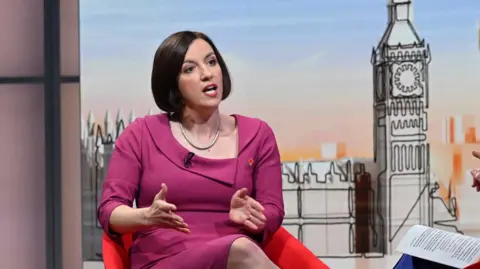
[ad_1]
 BBC
BBCEducation Secretary Bridget Phillipson has said “working people” will not see more tax on their pay slips after Wednesday’s Budget.
During the election, Labor promised not to raise national insurance, income tax or VAT on working people, but ministers have since come under pressure to define exactly who will be covered.
Appearing with Laura Kuenssberg on Sunday, Phillipson said the manifesto referred to people “whose main source of income is the income they earn from going to work”.
He avoided saying whether he thought business owners could be considered working people.
Conservative shadow science secretary Andrew Griffiths accused Labor of coming into government on a “false prospectus that things will be easy”.
“They essentially lied to the British people in terms of their plans,” he said.
Shortly after coming to power, the Labor government accused the Conservatives of leaving a “£22 billion black hole” in the public finances.
Chancellor Rachel Reeves is expected to announce some tax rises when she presents the budget next week, to avoid cuts in public spending.
The government is considering increasing taxes on the sale of assets, such as shares and property, changes to inheritance tax etc. Stabilizing the income tax range.
Continuing the tax cap cap imposed by the previous government would bring more people into the higher tax bracket and could raise an estimated £7 billion for the government.
Speaking on Sunday, Phillipson said she could not give specifics about what would be in the budget, but said: “When people look at pay slips they will not see higher taxes.
“It’s a very clear commitment.”
He said the government “wants to break the destructive cycle of higher taxes on working people and lower growth rates”.
Asked whether she would consider earning up to £160,000 as a minister as a working person, she replied: “My income comes from my job and I pay whatever tax I’m expected to pay.” Will do.”
Asked whether a small business owner would be counted as a working person, she said she could not go into specific details about “who may or may not be included in the tax measures that are in the budget.” May be or may not be”.
She said she understood people’s frustration but added, “They don’t have much time to wait.”
He reiterated the government’s message that ministers faced “difficult choices” following the “legacy” left by the previous Conservative government.
In the same programme, Griffith accused the government of behaving “like the worst form of a dubious car hire firm, fronting small prints that never existed”.
chancellor is also expected The budget also includes raising the national insurance rate for employers and lowering the threshold at which employers start paying tax to raise £20 billion.
Businesses argue the increases will make it harder to hire workers, hindering the government’s goal of boosting growth. These increases may also impact employees if employers choose to reduce wage increases.
‘Sour-sweet budget’
Andy Haldane, a former Bank of England economist, said: “It makes no real sense to differentiate between working people or not.
“The truth is that it is very unlikely during this Parliament that we will not all pay a little more to close the gap.
“In the land of tough choices, this was always going to be a bittersweet budget.
“The bitter part is the tax pill, which will be big, and the sweet part is the investment.”
Ahead of the July general election, the Institute for Fiscal Studies think tank accused both main parties of a “conspiracy of silence” on public finances.
IFS director Paul Johnson said “eye-wateringly difficult choices” would be needed if the government wanted to stick to a self-imposed rule that debt should be reduced in proportion to the size of the economy in five years’ time.
[ad_2]
Source link




![NZ v AUS [W] 2024/25, New Zealand Women vs Australia Women 2nd ODI, Wellington Match Report, December 21, 2024 NZ v AUS [W] 2024/25, New Zealand Women vs Australia Women 2nd ODI, Wellington Match Report, December 21, 2024](https://i3.wp.com/img1.hscicdn.com/image/upload/f_auto/lsci/db/PICTURES/CMS/393400/393416.6.jpg?w=1200&resize=1200,0&ssl=1)




